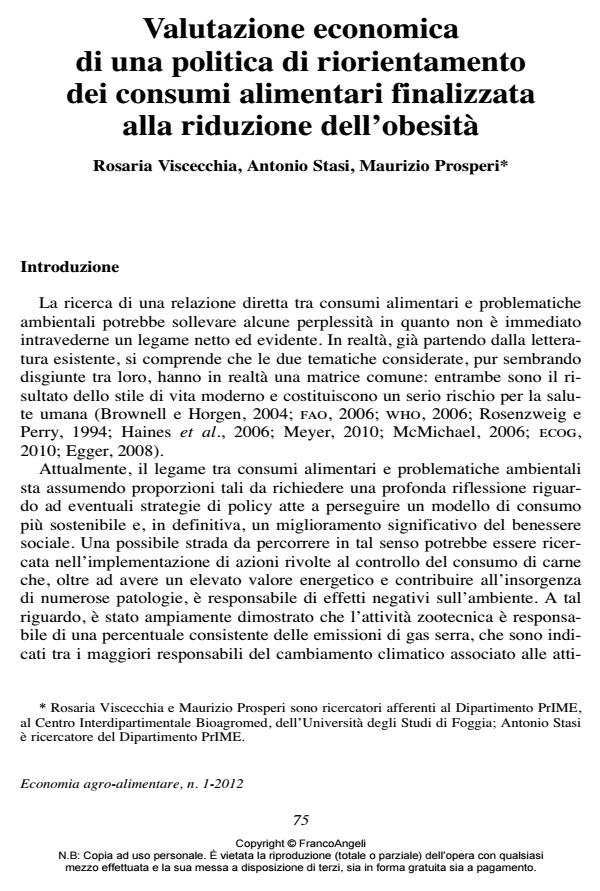Valutazione economica di una politica di riorientamento dei consumi alimentari finalizzata alla riduzione dell’obesità
Titolo Rivista ECONOMIA AGRO-ALIMENTARE
Autori/Curatori Rosaria Viscecchia, Antonio Stasi, Maurizio Prosperi
Anno di pubblicazione 2012 Fascicolo 2012/1
Lingua Italiano Numero pagine 24 P. 75-98 Dimensione file 264 KB
DOI 10.3280/ECAG2012-001004
Il DOI è il codice a barre della proprietà intellettuale: per saperne di più
clicca qui
Qui sotto puoi vedere in anteprima la prima pagina di questo articolo.
Se questo articolo ti interessa, lo puoi acquistare (e scaricare in formato pdf) seguendo le facili indicazioni per acquistare il download credit. Acquista Download Credits per scaricare questo Articolo in formato PDF

FrancoAngeli è membro della Publishers International Linking Association, Inc (PILA), associazione indipendente e non profit per facilitare (attraverso i servizi tecnologici implementati da CrossRef.org) l’accesso degli studiosi ai contenuti digitali nelle pubblicazioni professionali e scientifiche.
Modern lifestyle is one among the most relevant causes of alimentary disorder and environmental problems. Preventing both of them implies a win-win strategy for the improvement of social wellness (i.e. health and environmental benefits). A suitable strategy could be addressed to the partial substitution of caloric food (e.g. beef meat), which is also responsible for a large amount of greenhouse gas (ghgs) emissions, with less caloric food (e.g. vegetables), which is proved of exerting a lower impact on climate change. The analysis is referred to the Italian case study, based on data from the Italian Statistical Institute (istat). The relationship between obesity and ghgs emissions is here explained experimentally through a 5-stage methodology. In the first step, a regression model (ols method) is adopted to explain obesity rate in terms of ratio of people consuming meat more than once a week, and the ratio of people consuming vegetables less than once a day. The outcome of this analysis allows simulating a policy target in terms of obesity abatement, provided by a reasonable change in food demand. In the third step, a meta-analysis of Life Cycle Assessment (lca) studies has been performed in order to calculate the CO2 emissions of the food types we considered. In the fourth step, the observed change in food demand from the previous step is combined with lca indicators, in order to evaluate the impact of food industry on climate change. Finally, in the fifth step, the benefits of the obesity reduction are calculated considering the cost saving for health care of the obesity, which amounts to 1.700 Eur per person. In addition, the value of the CO2 emission have been compared with the value of the European Union Allowance (eua) of CO2 emissions, which was evaluated in 2009 in terms of 21.45 eur/t CO2. Consequently, we found that the effect of the policy can be estimated in terms of 1,032 Million eur, of which the impacts on human health is the most important (about 1.020 Million eur). The study shows the evidence that the consumption of food with low content of calories has a most relevant effect in the reduction of obesity, but very limited economic effect in terms of CO2 emissions.
Parole chiave:Obesity, health policy, ghgs emissions
Jel codes:I18, Q54
- Le sfide per uno sviluppo sostenibile del sistema agroalimentare italiano e non solo Fausto Cantarelli, in ECONOMIA AGRO-ALIMENTARE 2/2016 pp.229
DOI: 10.3280/ECAG2016-002007
Rosaria Viscecchia, Antonio Stasi, Maurizio Prosperi, Valutazione economica di una politica di riorientamento dei consumi alimentari finalizzata alla riduzione dell’obesità in "ECONOMIA AGRO-ALIMENTARE" 1/2012, pp 75-98, DOI: 10.3280/ECAG2012-001004